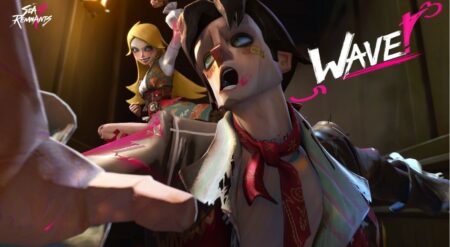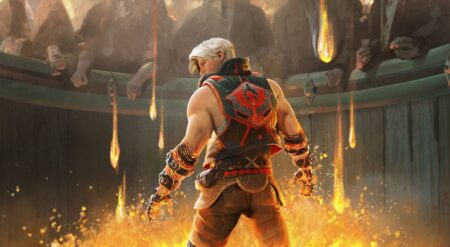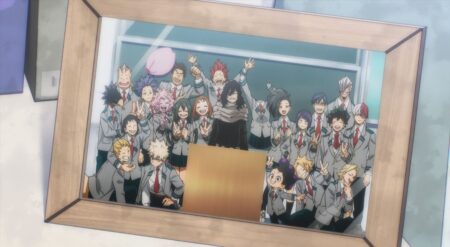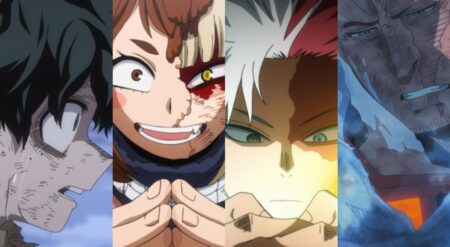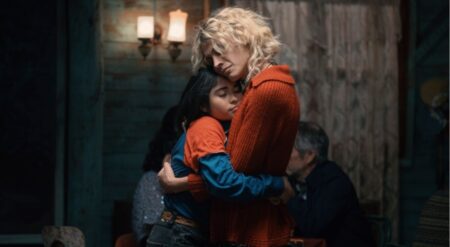Revenge of the Savage Planet is a sequel I didn’t know if we would get. The sequel game to Typhoon Studios’ Journey to the Savage Planet, this title comes from a new studio, Raccoon Logic, that formed after Google took an apathetic ax to the original game when it sunset Stadia. But in that resliliency comes comedy, and that’s what keeps Revenge of the Savage Planet and its couch co-op push to bring players joy going.
We spoke with Creative Director Alex Hutchinson about what it is like making a video game without corporate overlords, why co-op is central to comedy in video games, and the one question fans want to know: why third person?
BUT WHY THO: My first question has everything to do with co-op. I played Journey To The Savage Planet co-op, but more importantly, I only played it co-op. It was fantastic to see the renewed, very sharp focus on couch co-op for a game with Revenge of the Savage Planet. Right now, many people are pushing towards solo and forgetting how many people bond over playing games together. So I wanted to ask, what was the impetus for ensuring that there was the ability to play co-op in multiple ways for Revenge of the Savage Planet?
ALEX HUTCHINSON: Lots of different people in the team and in different combinations have worked on a lot of two-player co-op games over the years, whether it’s Far Cry 4 or the original Journey to the Savage Planet or, you know, Army of Two, the different variations of that. So we’d had a lot of success [developing co-op games], and the reason we did it in those games was the same as this game: we grew up playing couch co-op.
So, some of my fondest memories are on the couch with my best friend and a pizza on Saturday, playing Super Nintendo games or Genesis games or all that sort of stuff. So we wanted to bring that back, especially since now, a lot of us have kids.
There are three flavors [of co-op play]. For you, you play with your husband, or with us [we play] with our kids, or for the kids, they play together. It’s just a fun way to play, and it seems more human, especially in a world that is leaning more and more toward wanting to be isolated and alone. Co-op gaming seems like a much better way to go instead of the other direction.
Yes, Revenge of the Savage Planet is an open-world couch co-op Metroidvania.
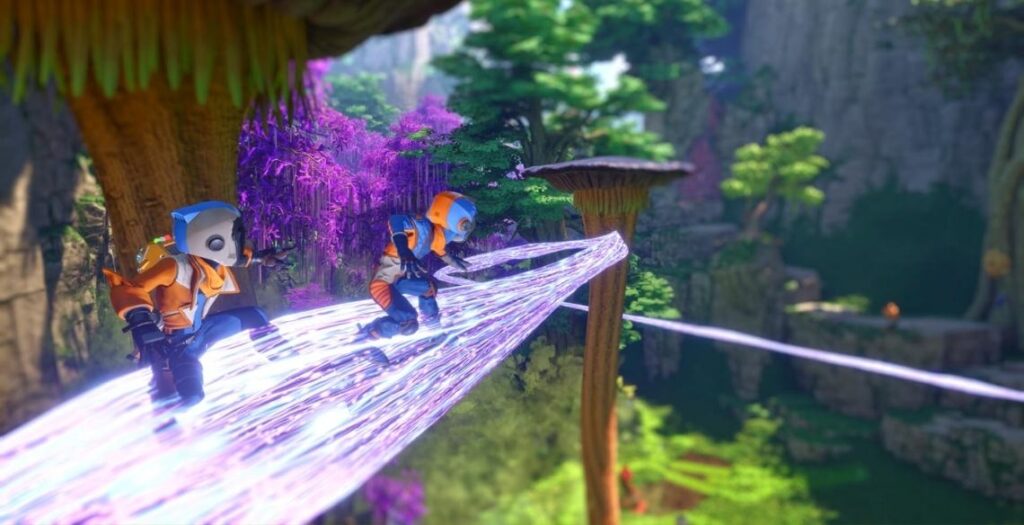
BUT WHY THO: When we play together, the very developed sense of Metroidvania is what’s really exciting. Can you talk about your influences to build this out and how that also lends to playing with somebody else?
ALEX HUTCHINSON: Yeah, so, like, we were definitely influenced a little bit by Metroid Prime on the first game, and this one too. I don’t know if there’s actually a third-person platforming Metroidvania out there right now?
BUT WHY THO: I keep trying to think about it. I think when I played the demo at [The Game Awards], I kept trying to think if I’ve played a Metroidvania like this…
ALEX HUTCHINSON: Well, that’s hopefully the case! [We wanted it] to be fresh, but it still have a lot of Metroid Prime’s DNA, like navigating in 3d space. We’ve tried to expand it and evolve it a little bit to have multiple keys to certain doors. With most Metroidvanias, it’s like a blue missile on the blue lock, and a yellow missile on the yellow lock, all that sort of stuff. We’ve tried to make it more state-based.
So, you know, things that need to be burnt or things that need to be blown up, you know, as the obstacle. And there are different ways to do that, giving it a bit more player agency and flexibility. But yeah, there were a lot of influences, obviously, from the traditional Metroid and Castlevania, to Metroid Prime.
In our game, there was a lot of sort of Far Cry DNA in there as well. You know, this idea of sort of a play space that you’re goofing around in, where there’s a lot of free-form exploration in? So we wanted to create a hybrid of, sort of, but still open-world game and Metroidvania.
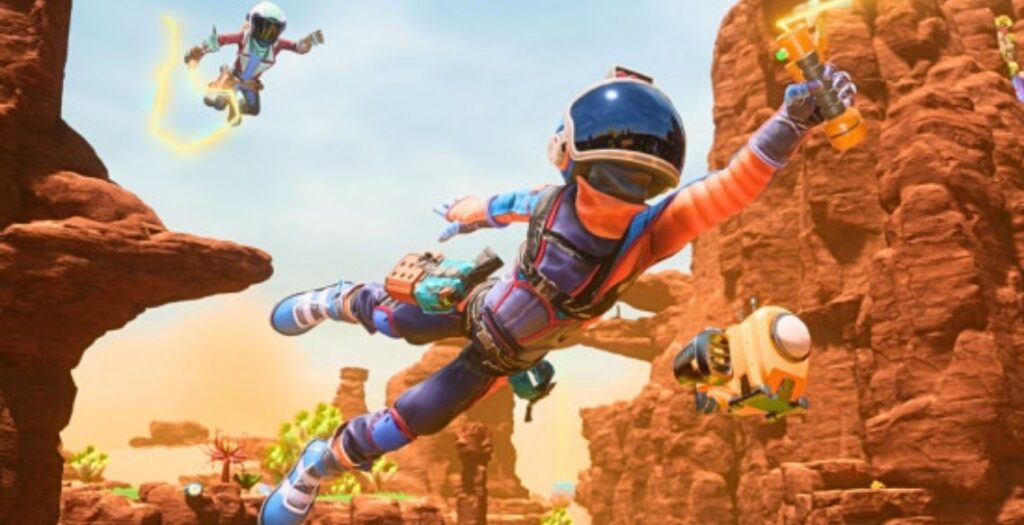
BUT WHY THO: I was blown away during the demo at how large [Revenge of the Savage Planet] is compared to before. The game loop has expanded more, and it’s clear that there are more options for weapons to play with–and well, goo to equip–and, ultimately, ways to navigate the world. I think what was fascinating was seeing the multiple levels of solving environmental puzzles.
So the question is, when you’re building out puzzles in the world, how do you build it so that it’s approachable, but also takes advantage of such a large number of variables that a player may choose to play with?
ALEX HUTCHINSON: If you look at Subnautica, which is also an influence,, and you think about freeform exploration, we wanted that. We wanted not to go as hardcore as that, but we didn’t want [Revenge of the Savage Planet] to just be a linear experience, like a button tunnel that you go down.
We’re trying to split the difference there, where there’s always a quest objective for the player, and you can always scan areas, and the game will tell you roughly where to go. But the game will not tell you how to get there. But the level design goals were to distract you every time. So, as you go [to the objective], you should be distracted by other stuff.
We see it as the gameplay potato for a while, but if you imagine a big oval, there are the key points you have to go to within that. But we also position distractions that are visible from those points. Ideally, the game is always dragging you off the beaten path and asking you to go and poke a rock or duck. Go into a cave or swim down into a pool, and you can be safe knowing where to go if you get confused.
BUT WHY THO: There is an investment in the environment when it comes to comedy that is really appealing. It is its own vehicle for humor. There is even comedy in the creature designs and the lore behind them. There’s so much detail and granularity to where the comedy lives. How did Racoon Logic approach humor from a development standpoint? How do you all work together to ensure that every bit has that special Revenge of the savage player, and it’s not just layered on?
ALEX HUTCHINSON: We realized that comedy is such an underrepresented segment in video games because most people try to put it only in the dialogue. So we realized that there was all of this available opportunity in the art itself, especially the gameplay, to inject virtual slapstick humor. Especially in co-op! Playing with your friend who’s not as competent as you might hope every time [is its own slapstick humor]. That is always funny as well.
[We see our comedy] as a layered approach, where we try to put it everywhere. We don’t want to linearly lead you to the joke, just like the level design, and just tell one joke. We want it to be everywhere, and we want it to be snappy and quick so that if you don’t find it funny, it’s passed already. If you find it funny, that’s great. We talk about how we want people to be sort of snickering to themselves as they play the whole time.
We want people to [laugh] as they go along. And if we get that through, watching your friend burn to death, or kicking them off a cliff, or a funny ad at the habitat, or even a one-liner, that’s great! But so we’re trying for density. Really, we’re trying to jam it everywhere, and then the process of making that work is just iteration… We think it’ll be as funny as possible for as many people as possible.
Free-form exploration, couch co-op, and the joy of kicking your friend off a cliff.
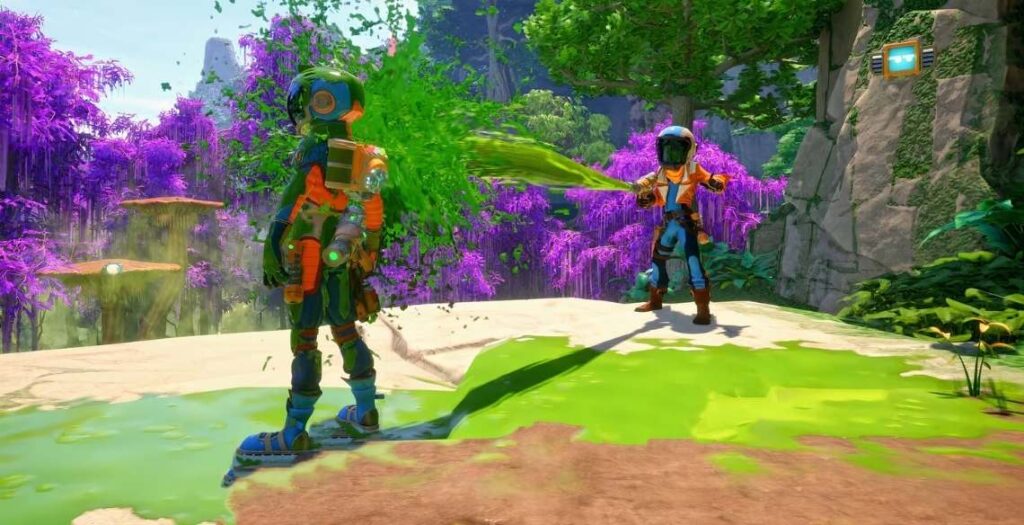
BUT WHY THO: When I played the demo, it also felt like the comedy is—unfiltered isn’t the right wors—but unrestrained. There’s an unrestrained approach to the creativity in the game and the types of jokes being used. I wanted to ask what types of creative freedom come with being both developer and publisher versus the first outing. How have you felt as a creator in this different development environment?
ALEX HUTCHINSON: [This development cycle] is a lot more fun, I’ll tell you that much. It’s a bit cheap because, you know, we welcome feedback. We love criticism. But we also like being able to stick to our guns when we believe in it and when things get too corporate—and luckily, that’s part of the satire in the game. They get bland and they get gray and they get boring.
When I was working on AAA stuff, I realized that about half of my day was spent debating with people who didn’t really care about the content, [pushing] not to let them change it. It sucks the life out of you after a while, and it’s nice to be able to push it. The video game industry is so tame. If you think about music, or if you think about movies and what people say, and the kind of content that’s made [in those industries], you realize that games are so safe.
It’s not that we want to be offensive, that’s not it. But where is punk rock in video games? Where’s someone doing something radically different? It just seems like a missed opportunity. It felt like a good business decision, as crazy as that sounds, to run with [Revenge of the Savage Planet] because you’re not allowed to at a big studio.
I think that all of the franchises [I worked on], whether it’s an Assassin’s Creed or an Army of Two or The Sims, it all starts with the first one. The reason [those games] became franchises was because they were pushing boundaries. Then, they get safer and safer and safer and safer and safer over time, because studios don’t want to lose their golden egg.
And you’re like, you got to keep running [and pushing boundaries] because, otherwise, it sort of wears itself out. I think only very few developers manage that. But I hope they still have the spark.
BUT WHY THO: I think that comes across loud and clear in the game, especially in the mechanics. When I was playing, as someone who tends to beat platformers a lot faster than other people, it was really cool to see the ways that each platform and puzzle can be approached. It feels like creativity first for the player. So, to go off of your last answer, how did Raccoon Logic keep the spark from the first game? How did the team keep pushing the boundary?
ALEX HUTCHINSON: We did that through the big push for third person. Third-person ends up being more accessible. VR struggles with this, too, but there are some issues with how your brain processes first-person and all that sort of stuff. So I think [third-person perspective] is more accessible. It means we can brand the game a bit better, so reach more people
We’re sort of looking at first sequels, and [with them], you get to do the bigger, better, and approach more as well, which is kind of fun. In the first game of any IP, there’s always stuff left on the cutting room floor, so it’s fun to be able to pick all those pieces up and run with them. We’re still excited to push even the ideas we had in the first game further in this one.
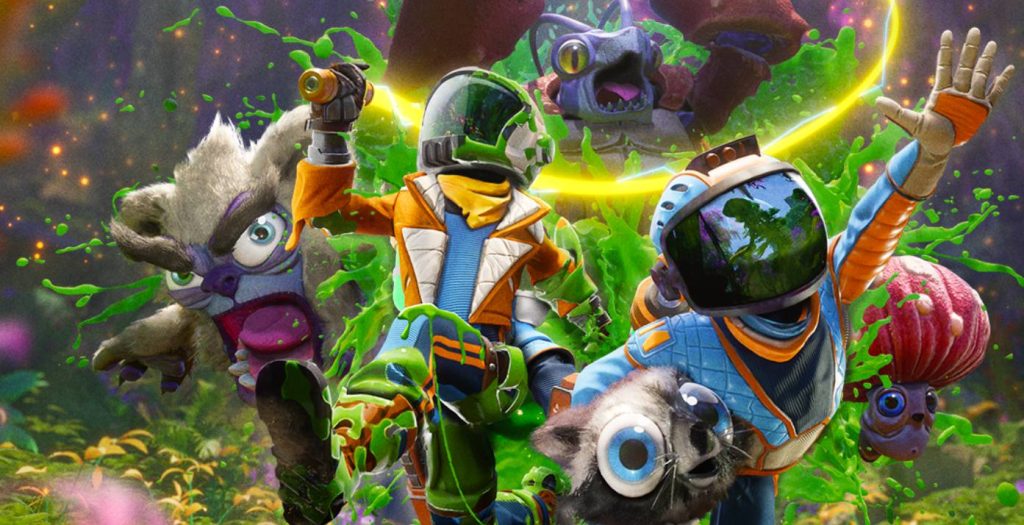
BUT WHY THO: When a player jumps into Revenge of the Savage Planet, what do you hope they take away from it?
ALEX HUTCHINSON: I think we just really want to [give players] a sense of joy. I think lots of games—these days especially—are grim and dark, even when they’re meant to be fun. We already live in a dystopia.
We may be putting you in a dystopia, but we like the idea of an optimistic dystopia. One where you, as an individual, are having fun, even though the world is crumbling around you. I think [Revenge of the Savage Planet] is a topical moment. Not that we expected it to be quite as topical as it seems to be becoming. But we just want people to have joy and optimism that even when things are terrible, you know what I mean? You can find a way through it.
BUT WHY THO: It’s very interesting to put it that way too. I think the idea is that the game puts you in a situation where the company you work for got acquired, and everything is bad. But also, there are these really cute creatures that you can go look at. But that joy, that kind of balance between showcasing a dystopia, but bringing joy is tricky.
I’m very curious, from a comedic standpoint, is that a hard line to ride? Were there any comedians specifically, or any specific delivery styles that you all were looking to for inspiration?
ALEX HUTCHINSON: I think it’s a more British sense of humor than American. If that makes sense? I’m Australian, but, you know, obviously heavily influenced by our colonial past. I think people like Douglas Adams were a big influence on [Revenge of the Savage Planet], or even Ricky Gervais.
Like, the world is awful, but it’s still funny. I think when you combo it, especially in couch co-op, I realized that no matter what you do, it’s funny. You can be telling this most serious story you want, but in co-op, it will always be funny. You know? It’s actually almost impossible, in my opinion, to do the opposite. I mean, have people be serious when playing couch co-op.
I remember we were playing Far Cry 4, and I was trying to clear an outpost. I was just throwing a Molotov cocktail at an enemy, and I missed him, and I set a bear on fire. Then, the bear killed my friend, and that was the funniest thing ever. You know what I mean?
Like a burning bear accidentally killed my co-partner, and so you can’t avoid it, because there’s no real cost in a video game, it’s not my real life. I know I’m not really dying. I know it was actually the core joke of Far Cry 4 is that everyone says, “I’m here for the story and to bury my mother,” and really, you’re like, “No, you’re here to shoot things!”
Yes, the initial joke was in the first room. You get offered that if you’re into that story, you get offered in the very first cinematic in the game. But no one chooses to do it; 99 percent just load a gun, run out, and start shooting everything. So I think it’s easier to lean into the comedy of the situation than it is the earnestness. And then you can get a fun sort of comparison by having the story trying to be earnest while you are running around as an agent of chaos. I think that’s the way to hit the balance.
“[Home base] the riskiest joke we’re telling”
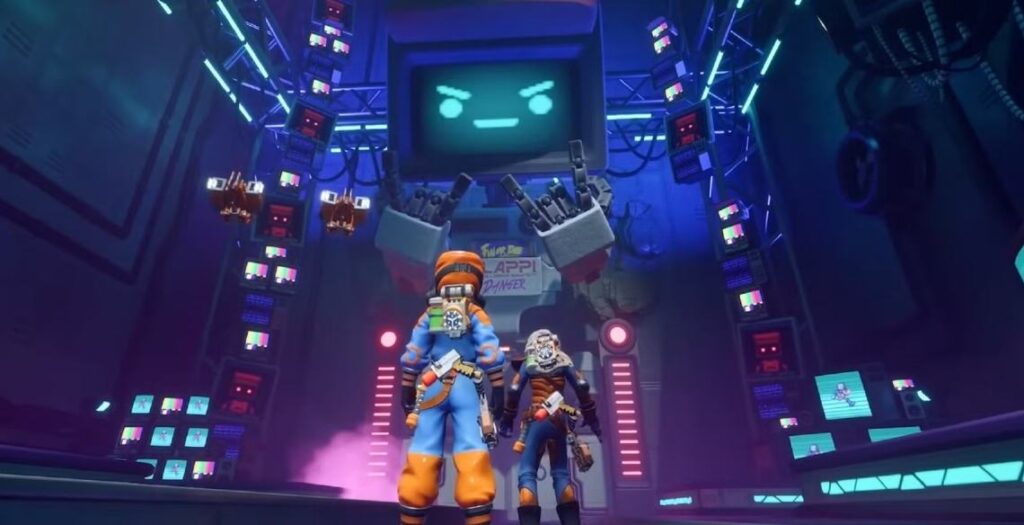
BUT WHY THO: The next thing I wanted to ask was about housing! What influenced adding customization features to the sequel? Revenge of the Savage Planet doesn’t just have more planets to go to. It also has more ways to invest by building your base or editing your clothes.
ALEX HUTCHINSON: I’m a big fan of home bases and games. I put one into Assassin’s Creed 3, if you remember, in the homestead. I worked on The Sims for a long time, and I remember Will Wright saying that The Sims is a joke about capitalism, because you buy stuff and then you go to work, so you’re better off going to work to get more money to buy more stuff, to go to work.
So if we’re going to be making a dystopia, we should push that even further. Here, you get ultra bucks or coupons from crates that you can only use in the ultra store to buy stuff, and all it has is a funny little animation.
There’s actually not even any gameplay attached to it. So it’s like your trophy cabinet, your big trophy cabinet of useless crap that you accumulate over the game. So that’s the riskiest joke we’re telling. The base upgrades are hard because they’re completely devoid of gameplay. They’re really just trophies. I’m curious to see how people react, but hopefully you will love it.
BUT WHY THO: Whenever I interview people, I do like to ask this question. I feel like in any creative process, a developer, a filmmaker, you’re putting a little bit of yourself into the game and the creation you’re making for people. What part of you do you think you’ve left in Revenge of the Savage Planet? The bitterness of dystopia?
ALEX HUTCHINSON: I think that’s it. Especially on a team like ours, there are only 30 of us. So it is, as much as that used to be a big team when I started. Now it’s a very small team, which is funny. But I think I left the tone. I think that [Revenge of the Savage Planet] really is my sense of humor. You can be occasionally crass, occasionally actually witty, and sort of laughing at things and yourself. Hopefully it’s a tone, but it’s also more of a feeling.
During GDC, I got the chance to go hands-on with the couch co-op version of Revenge of the Savage Planet, and it’s even better than playing independently. Additionally, the payoff of switching perspective to the third person makes the most of the split-screen setup. Whether you’re playing with your kid or your partner, this is a title to keep in mind. And, if you want a little taste of the humor behind this game, make sure to check out the original, but know that the second is already shaping up to be even better.


